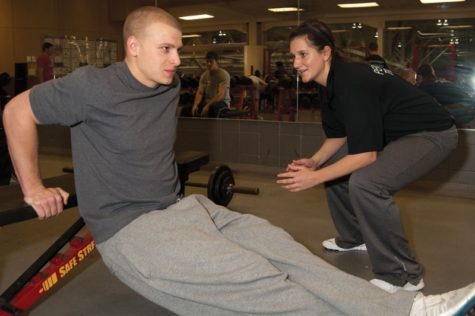Control stress to improve health
January 22, 2012
While spring semester is still beginning, the first exam is probably just around the corner for many students. Even though one exam is nothing to be frightened by, many first exams fall within the same week, or worse, the same day. With exams piling up, so can stress.
“Everyone handles stress differently,” said Karen Scheel, senior lecturer of psychology. “It’s important to understand how your body handles stress and plan accordingly. An athlete, for example, may perform quite well under the pressure of an overtime clock in a tied game, or can just clam up and not be able to perform at all.”
By understanding what stress level an individual operates best at, students can recognize when situations may be more stressful than others.
“If you are easily stressed, plan ahead. Recognize when a situation is out of your control and focus on the positives, rather than the negatives, of the situation,” Scheel said.
Scheel explained how negative emotions can give people “tunnel vision,” in which people become so stressed about one thing that they can only focus on that particular thing.
“While it was a survival trait years ago, such as needing to run from a bear, students have much more complex situations that require more than a one-track thinking,” Scheel said.
“Tunnel vision” is a problem for people because it can take up valuable space in the brain’s processing capacity.
“Positive emotions have a different effect on our thoughts,” Scheel said. “Instead of creating a tunnel vision, they open our minds and allow us to see various angles of the problem presented. Looking at stressors with a positive mind instead of a negative one can reduce stress.”
Scheel emphasized how taking care of one’s body will improve one’s mental state.
“Exercise, eating well, getting enough sleep are important in stress management,” Scheel said. “Let sleep be the last thing you give up, and it is important to stick to a routine bedtime and wake-up time. Your body needs a rhythm to follow.”
Many students have the unfortunate habit of turning to food in a time of stress.
Sally Barclay, food science and human nutrition clinician, offers helpful advice to stop the stress snacking.
“Adequate sleep, a good support network, stress management such as yoga, meditation, deep breathing may all help to control cravings,” Barclay said. “Deprivation [of food] is not recommended as this may just serve to increase cravings. Enjoy an occasional treat and get plenty of variety to help curb cravings.”
Barclay said she recommends keeping healthy snack food options, such as fresh fruit or veggies, yogurt and popcorn, for when you are truly hungry and not just responding to negative emotions.
“Respond to other emotions such as boredom, loneliness, frustration by distracting yourself with a walk, playing with your pet, calling a friend, listening to music or watching a movie,” Barclay said. “Food can really only solve hunger and should not be used for comfort and coping with emotions.”
Barclay said if you have an episode of emotional eating, you should forgive yourself and start anew the next day.
“Try to learn from the experience and make a plan for how you can prevent it in the future. Focus on the positive changes you’re making in your eating habits and give yourself credit for making changes that’ll lead to better health,” Barclay said. “If you’ve tried self-help options but you still can’t get control of your emotional eating, consider therapy with a professional mental health provider.”







